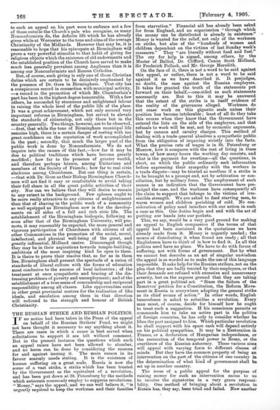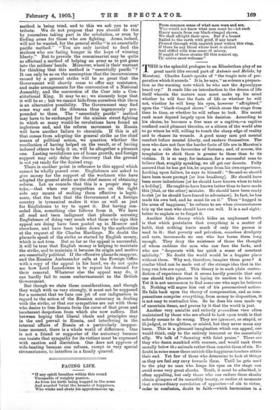the money can be distributed is already in existence." Money
is wanted for the relief, not only of the workmen on strike, but also of the " hundreds of women and children dependent on the victims of last Sunday week's massacre." They " are literally without food and fuel." The cry for help is signed, among others, by the Master of Balliol, Dr. Clifford, Canon Scott Holland, Sir Frederick Pollock, and Mr. George Meredith.
On the face of it, there is not a word to be said against this appeal, or rather, there is not a word to be said against it as we have described it. It prejudges, no doubt, the case against the Russian employers. It takes for granted the truth of the statements put forward on their behalf,—one-sided as such statements necessarily are. But to this it may be answered that the extent of the strike is in itself evidence of the reality of the grievances alleged. Workmen do not cease work on this gigantic scale unless their position has become intolerable ; least of all do they take this course when they know that the Government have entered the lists on the side of the employers, and that refusals to work will be met, not by economic arguments, but by cannon and cavalry charges. This method of dealing with a trade quarrel absolves a sympathetic public from the obligation of inquiring strictly into the facts. What the precise rate of wages is in St. Petersburg or Moscow, how it compares with the cost of living in these towns, of how many hours the working day consists, and what is the payment for overtime—all the questions, in short, on which the public ordinarily seek information before expressing their sympathy with the workers in a trade dispute—may be treated as needless if a strike is to be brought to a prompt end, not by arbitration or con- ciliation, but by military force. The employment of such means is an indication that the Government have pre- judged the case, and the workmen have consequently all the claim to support that belongs to the victims of irre- sistible strength. We are asked to feed starving men, to warm women and children perishing of cold. No con- sideration of policy need interfere with our action in such a case as this. Our duties begin and end with the act of putting our hands into our pockets.
This, we say, would be a very good ground for making an appeal to English compassion if the terms of that appeal had been contained in the quotations we have already made from it. Money is urgently needed ; the means of distributing it when found are ready ; all that Englishmen have to think of is how to find it. In all this politics need have no place. We have to do with forms of suffering, not with forms of government. But by what we cannot but describe as an act of singular unwisdom the appeal is so worded as to make the use of this language impossible. It asks help for the Russian strikers, not on the plea that they are badly treated by their employers, or that their demands are refused with excessive and unnecessary severity, but on the express ground that they are taking part in a great political act. " Since the failure of the Zemstvos' petition for a Constitution, the Reform Move- ment in Russia is everywhere adopting the general strike as its chief means of action." In other words, English benevolence is asked to subsidise a revolution. Every man must, of course, decide for himself how he ought to treat such a suggestion. If his conscience permits or commands him to take an active part in the politics of foreign countries, he has only to consider whether he likes the part assigned to him. Which particular revolution he shall support with his spare cash will depend entirely on his political sympathies. It may be a Restoration in France, or a declaration of Hungarian independence, or the restoration of the temporal power in Rome, or the overthrow of the Russian autocracy. These various aims will appeal with varying force to different classes of minds. But they have the common property of being an intervention on the part of the citizens of one country in the determination of what kind of government shall be set up in another country.
The issue of a public appeal for the purpose of raising money for such an intervention seems to us to involve the signatories in a very grave responsi- bility. One method of bringing about a revolution in Russia has, they say, been tried and failed. Now another method is being tried, and to this we ask you to con- tribute. We do not propose that you should do this by yourselves taking part in the revolution, or even by finding arms for those who are fighting. Arms, indeed, will not be wanted, for the general strike " is an essentially pacific method." "You are only invited to feed the strikers who are facing hunger in the hope of winning liberty." But to provide the commissariat may be quite as effectual a method of helping an army as to put guns into the soldiers' bands. Moreover, where is' their warrant for thinking that this method is "essentially. pacific " ? It can only. be so on the assumption that the inconvenience caused by a general strike will be so great that the Government will shortly cease to offer any resistance, and make arrangements for the convocation of a National Assembly, and the conversion of the Czar into a Con- stitutional King. It may be so ; we sincerely hope that it will be so ; but we cannot hide from ourselves that there is an alternative possibility. The Government may find some way out of the dilemma thus ingenuously pro- pounded to them. The " essentially pacific " method may have to be exchanged for the aimless street fighting in which so many would-be revolutions have found an inglorious end, and the reform movement in Russia will have another failure to chronicle. If this is all that comes from adopting the general •strike as the chief means of political action, we question whether the recollection of having helped on the result, or of having induced others to help it on, will be altogether a pleasant one. Lasting revolutions are of home growth, and foreign support may only delay the discovery that the ground is not yet ready for the desired crop. There is another point in reference to this appeal which cannot be wholly passed over.. Englishmen are asked to give money for the support of the. workmen who have adopted the general strike as the chief means of obtaining reform. Let us concede that this is a proper step to take,—that when our sympathies are on the right side any means of making them effective is legiti- mate, that the fact that the Government of a foreign country is tyrannical makes it wise as well as just for Englishmen to try to upset it. But having con- ceded this, something else follows from it. We have all read. and been indignant that placards accusing Englishmen of doing very much what those who sign this appeal are doing have been posted up in Moscow and elsewhere, and.. have been taken down by the authorities at the request of Sir Charles Hardinge. No doubt the placards speak of the strike as started by English money, which is not true. But so far as the appeal is successful, it will he true that English money is helping to maintain the strike, and to maintain it because its origin and motive are essentially' political. If the offensive placards reappear, and the Russian Ambassador calls at the Foreign Office with a copy of the' appeal in his hand, we do not quite see how Lord Lansdowne is to repeat his demand for their removal. Whatever else the appeal may do, it can hardly fail to cause embarrassment to the British Government.
But though we state these considerations, and though they weigh with us very strongly, it must not be supposed for a moment that we bate one jot of our indignation in regard to the action of the Russian autocracy in dealing with the strike, or that our sympathies are not with those who desire to free Russia from the curse of that gross and incoherent despotism from which she now suffers. But between hoping that liberal ideals and principles may in the end prevail in Russia, and interfering in the internal affairs of Russia at a particularly inoppor- tune moment, there is a whole world of difference. One is not a friend or supporter of the autocracy because one insists that sympathy for its victims must be expressed with caution and discretion. One does not approve of wife-beating because one refuses, except in very special circumstances, to interfere in a family quarrel.











































 Previous page
Previous page